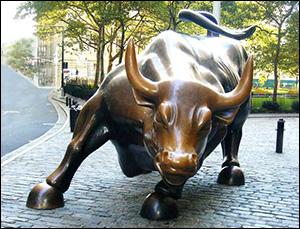By Pam Martens and Russ Martens: July 17, 2018 ~
With all the front page headlines on Russia’s meddling in the 2016 election to put Donald Trump in the White House, there needs to be some reflection on what’s happening today. Trump’s poll numbers are not collapsing today because the U.S. stock market appears to like Donald Trump. And since tens of millions of Americans’ 401(k) plans and future retirement prospects are tied to the stock market, self interest is playing a role in propping up the President’s approval ratings.
But to an ever growing degree, the U.S. stock market is being propped up by hedge fund algorithms, corporations taking on debt to buy back their own stock, big Wall Street banks’ dark pools trading in darkness and foreign central banks and foreign sovereign wealth funds gobbling up U.S. stocks.
Now it seems that the tiny window the public has heretofore had on those foreign central bank purchases is closing. On May 9 of this year, the Central Bank of Norway, Norges Bank, made a filing with the Securities and Exchange Commission and omitted the names of more than 2,000 U.S. traded stocks it owns with a value of more than a quarter of a trillion dollars. It explained its actions as follows in the filing:
“Norges Bank has submitted its Form 13F to the Securities and Exchange Commission pursuant to a request for confidential treatment. This action is consistent with discussions between Norges Bank and the Staff of the Securities and Exchange Commission to coordinate the reporting required under Section 13(f) with the extensive public disclosure requirements under Norwegian law applying to Norges Bank.”
Norges Bank added a note explaining that while it didn’t want the public to have access to its holdings, it was filing the list of its stock holdings separately with the SEC.
We know, however, from the report previously filed for the quarter ending on 12/31/2017 all the names of the U.S. traded stocks the Norway Central Bank owned at that time. That included $29.6 billion in total in the big tech names of Amazon, Apple, Alphabet (parent of Google), Facebook and Microsoft.
The Norway Central Bank also held $10.33 billion in total in five of the biggest derivatives players on Wall Street: JPMorgan Chase, Goldman Sachs, Citigroup, Bank of America and Morgan Stanley – companies which are also plumping their stock prices by engaging in massive buybacks of their own stocks.
Another central bank which is also heavily invested in the U.S. stock market is the Swiss National Bank. Thus far, it has not asked to keep its holdings secret from the public. Its SEC filing for the period ending March 31, 2018 showed that it owned 2,484 U.S. traded stocks totaling $82 billion. That included $10.165 billion in total in Amazon, Apple, Alphabet, Facebook and Microsoft.
The Bank of Israel is another central bank that likes darkness when it comes to its stock holdings in the U.S. Its latest report to the SEC for the period ending March 31, 2018 doesn’t show the total number of its stock holdings nor the total amount invested. It shows only the names of the three money managers that are handling its investments: those are State Street Global Advisors, BlackRock, and UBS Asset Management. That, essentially, tells American citizens absolutely zero about how it’s meddling in our markets.
It is estimated that there have been more than a dozen central banks buying publicly traded stocks since the market crash of 2008. (For the massive role that the U.S. central bank, the Federal Reserve, has played on Wall Street, see the related article below.) In April of this year, Bloomberg News reported that the Bank of Japan (BOJ), a heavy player in the stock market, had spent $7.8 billion “on exchange-traded funds tracking the country’s shares last month, the biggest amount in data stretching back to 2010.” Bloomberg further noted that the BOJ was effectively propping up the market by stepping in “as the market slumped in a global equity rout…”
Central banks meddling in the stock market has market watchers correctly concerned. In April of 2016 Economist Ed Yardeni called it a Ponzi scheme, writing:
“In the long run, it’s hard to imagine that having the central monetary planners buy corporate bonds and stocks with the money they print can end well. In effect, the central banks are turning into the world’s biggest hedge funds, financed by their own internal primary (money-printing) dealers and backstopped by the government — which can always borrow more from the central bank or force taxpayers to make good on this Ponzi scheme…”
Related Article:
Nomi Prins’ New Book: Central Banks Have Become the Markets


